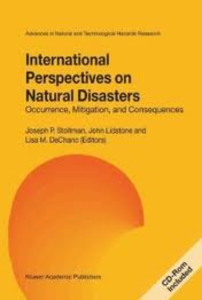The experience of natural disasters: psychological perspectives and understandings
Reser, Joseph P. (2004) The experience of natural disasters: psychological perspectives and understandings. In: Stoitman, Joseph P., Lidstone, John, and DeChano, Lisa M., (eds.) International Perspectives on Natural Disasters: occurrence, mitigation and consequences. Advances in Natural and Technological Hazards Research, 21 . Kluwer Academic Publishers, Dordrecht, The Netherlands, pp. 369-384.
|
PDF (Published Version)
- Published Version
Restricted to Repository staff only |
||
![[img]](https://researchonline.jcu.edu.au/14410/2.hassmallThumbnailVersion/14410_Reser_2004_front_cover.jpg)
|
Image (JPEG) (Front Cover)
- Cover Image
Download (5kB) |
Abstract
[Extract] Psychology is essentially concerned with how people make sense of their world and the nature of their transactions with their experienced physical and social environment. The human and more psychological side of disaster research and intervention relates to how people, both individuaHy and collectively, make sense out of extraordinary and threatening events and how they respond to and are affected by these critical1ife events. A psychological analysis of disaster response includes the processes of anticipation, anxiety, and fear; the representation or imaging of the threatening event; appraisal of the nature and magnitude of personal risk; motivation to act; and immediate and long term coping and adjustment. These processes are largely studied and understood from the perspective of the perceiving, feeling, and responding individual in an emergency situation.
Human response to disasters does not, of course, simply reflect the behavior of individuals. Families, organizations, and communities respond to emergencies and try to impose meaning and order on an often-chaotic and frightening set of circumstances. This community and organizational response is long term as well as immediate and finds expression in cultural sense making and institutional adaptations to such cataclysmic events, by way of belief systems, warning messages, and procedures and policies of state and national emergency service organizations. Other people also provide critical social support and important bases of comparison for confirming information and validating understandings and appropriate actions.
The role psychology has played in better understanding human response to natural and human-made disasters can be examined historically, in tenns of the increasing involvement of psychological practitioners and researchers in the area of disasters, in terms of the psychological processes involved in human adjustment and adaptation to disasters, or more situationally and thematically in terms of particular disasters in which psychologists have been closely involved, with such involvement leading to particular models and understandings of human response to disaster. It is also the case that a number of areas of psychological research and theory bear very directly on the topic of disaster response and impact. Theoretical models of stress and coping, decision-making under uncertainty, and post-traumatic stress disorder (PTSD) come readily to mind.
| Item ID: | 14410 |
|---|---|
| Item Type: | Book Chapter (Research - B1) |
| ISBN: | 978-1-4020-2850-2 |
| Keywords: | coping strategies; natural disasters; psychological factors; sense strategies |
| Related URLs: | |
| Additional Information: | Reprints of this book by Springer in 2007. |
| Date Deposited: | 24 Nov 2010 04:33 |
| FoR Codes: | 17 PSYCHOLOGY AND COGNITIVE SCIENCES > 1701 Psychology > 170199 Psychology not elsewhere classified @ 100% |
| SEO Codes: | 97 EXPANDING KNOWLEDGE > 970117 Expanding Knowledge in Psychology and Cognitive Sciences @ 100% |
| Downloads: |
Total: 483 Last 12 Months: 5 |
| More Statistics |



